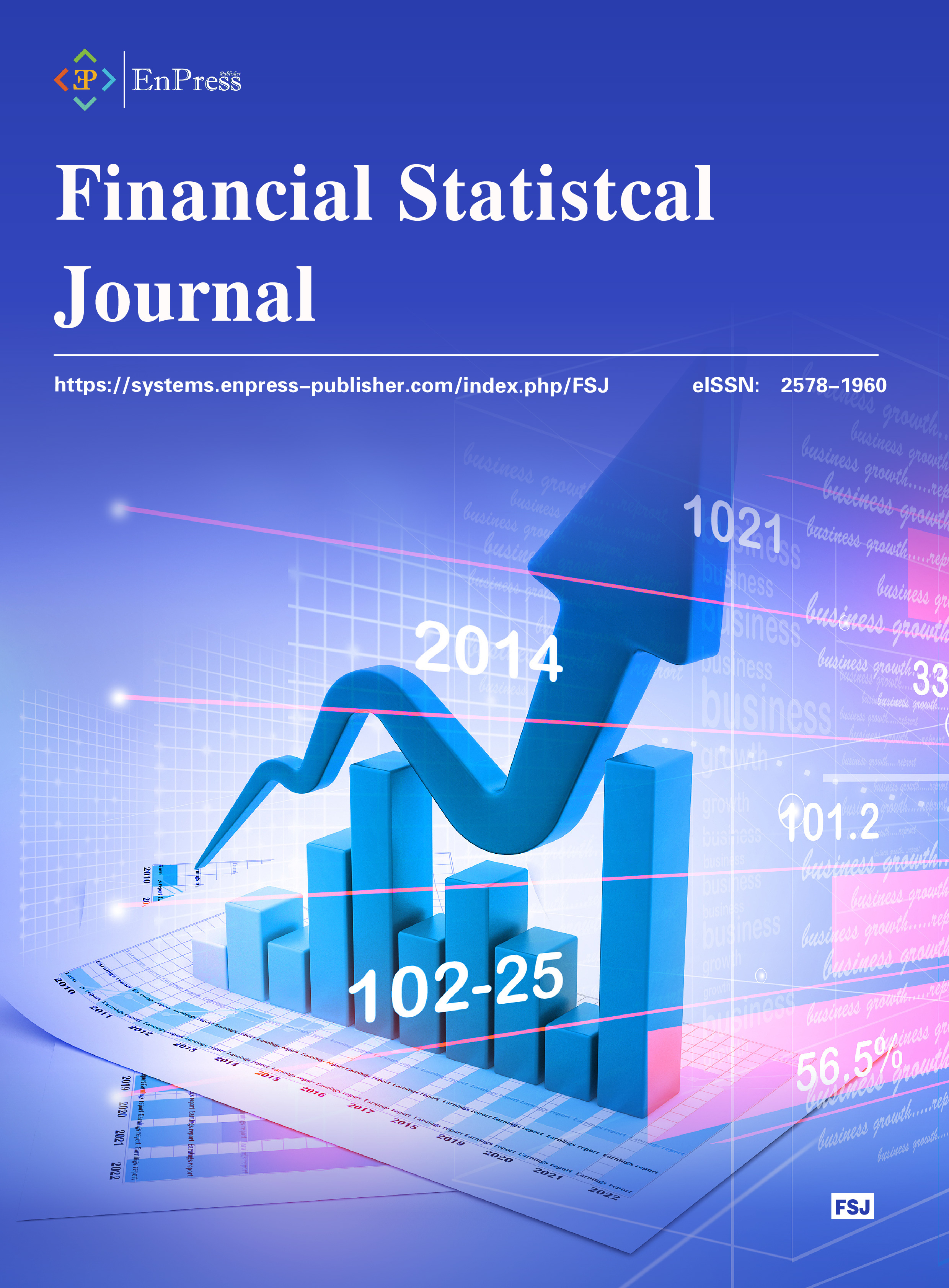|
Journal Abbreviation: Financ. Stat. J. |
Financial Statistical Journal (FSJ, eISSN: 2578-1960) is a prestigious journal dedicated to advancing the frontiers of knowledge at the intersection of finance and statistics with an open access model. We are committed to publishing high-quality, original research articles and review articles that contribute to the understanding and application of statistical techniques in financial contexts. The journal encompasses a broad range of topics that include, but are not limited to, the application of statistical methods, data analysis, econometrics, mathematical methods, simulation, and computation as they relate to finance. We aim to provide a platform for scholars, researchers, and practitioners to share their insights and findings, fostering a deeper understanding of financial phenomena through rigorous statistical analysis. |
Online Submissions
Registration and login are required to submit items online and to check the status of current submissions.
Already have a Username/Password for Financial Statistical Journal?
GO TO LOGIN
Need a Username/Password?
GO TO REGISTRATION
Submission Preparation Checklist
As part of the submission process, authors are required to check off their submission's compliance with all of the following items, and submissions may be returned to authors that do not adhere to these guidelines.
- The submission has not been previously published, nor is it under another journal's consideration (or an explanation has been provided in Comments to the Editor).
- The submission file is Microsoft Word file format.
- Where available, URLs for the references have been provided.
- The text adheres to the stylistic and bibliographic requirements outlined in the Author Guidelines, which is found in About the Journal.
- If submitting to a peer-reviewed section of the journal, the instructions in Ensuring a Blind Review have been followed.
Privacy Statement
EnPress Publisher respects and strives to protect the privacy of its users and visitors. Hence, users and visitors are encouraged to read EnPress Publisher’s privacy policy regarding the usage and handling of user information.
(1) User information
Names and email addresses entered in all EnPress Publisher’s journal sites will be used exclusively for the stated purposes of the journals and will not be made available for any other purpose or to any other party. For submission and peer review, users should register an account for further procedures, including but not limited to name, email, address, interests, affiliation, and postcode, as editors need the information to complete in-house processes (e.g., processing a manuscript).
When users visit the publisher's website, information about the visit is saved in web logs (e.g., device, IP address, time of visit, etc.), which are only used to help improve the structure and content of the website.
(2) User rights
Users have the right to register or update their personal information and contact the publisher to cancel/delete their account if required.
(3) Third-party link
EnPress Publisher is not responsible for private information obtained by third-party websites when users log in via a pop-up screen from third-party software installed on their computer.
When users visit third-party platforms (e.g., LinkedIn, Twitter, COPE, etc.) through hyperlinks from EnPress Publisher’s journal websites, the privacy policy follows the policies of the third-party platforms.
(4) Queries or contact
For any queries about EnPress Publisher’s privacy policy, please contact the editorial office at editorial@enpress-publisher.com.
Article Processing Charges (APCs)
Financial Statistical Journal is an Open Access Journal under EnPress Publisher. All articles published in Financial Statistical Journal are accessible electronically from the journal website without commencing any kind of payment. In order to ensure contents are freely available and maintain publishing quality, Article Process Charges (APCs) are applicable to all authors who wish to submit their articles to the journal to cover the cost incurred in processing the manuscripts. Such cost will cover the peer-review, copyediting, typesetting, publishing, content depositing and archiving processes. Those charges are applicable only to authors who have their manuscript successfully accepted after peer-review.
| Journal Title | APC |
|---|---|
| Financial Statistical Journal | $500 |
We encourage authors to publish their papers with us and don’t wish the cost of article processing fees to be a barrier especially to authors from the low and lower middle income countries/regions. A range of discounts or waivers are offered to authors who are unable to pay our publication processing fees. Authors can write in to apply for a waiver and requests will be considered on a case-by-case basis.
*Article No. is mandatory for payment and it can be found on the acceptance letter issued by the Editorial Office. Payment without indicating Article No. will result in processing problem and delay in article processing. Please note that payments will be processed in USD. You can make payment through Masters, Visa or UnionPay card.
Vol 8, No 2 (2025)
Table of Contents
Financial drivers and governance structures are two of the many aspects that affect earnings management. Firms can be encouraged to display consistent financial performance by financial drivers such as net income, total assets, annual revenue, and cash flow volatility. The effectiveness of governance procedures, particularly audit quality, is crucial in preventing earnings manipulation. The trustworthiness of financial accounts is increased by high-quality audits, especially those carried out by Big 4 audit companies. Because of their solid reputations and strict procedures, these companies are linked to less profit manipulation. Moreover, audit effectiveness and objectivity are strongly impacted by auditor independence and audit tenure. This study examines selected Nigerian deposit money banks, including Zenith Bank, Polaris Bank, First Bank, Access Bank, Union Bank, United Bank for Africa (UBA), and Wema Bank, from 2013 to 2023. The study’s goal is to close the gap between raw data and strategic decision-making by analyzing financial data from these institutions. This analysis is required to understand how financial measurements and audit characteristics affect the dependability of financial reporting. To assess the connections between their operational efficiency, profitability, and financial sustainability, important variables like Earnings Per Share (EPS), Cash Flow from Operations, Annual Revenue, Total Assets, Net Income, Audit Tenure, Revenue-to-Asset Ratio, and Net Income Margin are examined. The study uses multiple regression analysis as a methodological tool to investigate the relationships between independent variables, such as auditor independence, affiliation with the Big 4 audit firms, and financial metrics, such as cash flow operations and total assets, and dependent variables, such as Discretionary Accruals (DA), Earnings Quality (EQ), and Earnings Per Share (EPS). Bayesian Model Averaging (BMA) emphasized strong predictors and addressed model uncertainty. The accuracy and relevancy of the data were guaranteed by their sourcing from audit firm databases and publicly accessible financial reports. Earnings Per Share was found to be significantly predicted by annual revenue and audit tenure. Longer audit tenures and higher yearly revenues have a favorable impact on EPS. The significance of these variables in explaining variations in EPS was highlighted by the BMA method, which validated the findings’ robustness. No significant variables for categorical earnings quality classifications were found using multinomial regression.
Announcements
New research advances precision matrix estimation with multi-target linear shrinkage |
|
A groundbreaking study published on the Financial Statistical Journal of EnPress Press has introduced a novel approach to estimating large precision matrices using a multi-target linear shrinkage estimator. This innovative method, proposed by Yuang Xue and Lihong Wang from the School of Mathematics at Nanjing University, China, aims to enhance the accuracy and efficiency of precision matrix estimation, particularly in high-dimensional settings. For more information, please refer to the original article published on the Financial Statistical Journal of EnPress Press: Xue Y, Wang L. Multi-target linear shrinkage estimation of large precision matrix. Financial Statistical Journal. 2024; 7(2): 9912. https://doi.org/10.24294/fsj9912 |
|
| Posted: 2025-02-11 | More... |
Online Access to the articles of Vol.7, No.1, 2024 |
|
 We are pleased to announce that all the articles on vol. 7, No. 1, 2024, are now accessible online. This comprehensive collection is ready for your reading and research needs. |
|
| Posted: 2024-07-08 | |
Polish Quality Award for prof. Radosław Wolniak |
|
 |
|
| Posted: 2024-05-08 | More... |
| More Announcements... |




 Open Access
Open Access
